Objections To The Lunar Sabbath.

Objections To The Lunar Sabbath.
Many articles and videos have been produced, claiming to show
the 'error' of the Scripturally Ordained, Biblical lunar Sabbath.
The Seventh-Day is the Sabbath of the ETERNAL CREATOR:
(Exodus 20:8-11)[1] (KJV) 8Remember the Sabbath day, to keep it holy. 9Six days shalt thou labour, and do all thy work: 10But the seventh day is the Sabbath of the ETERNAL thy CREATOR: in it thou shalt not do any work, thou, nor thy son, nor thy daughter, thy manservant, nor thy maidservant, nor thy cattle, nor thy stranger that is within thy gates: 11For in six days the CREATOR made heaven and earth, the sea, and all that in them is, and rested the seventh day: wherefore the CREATOR blessed the Sabbath day, and hallowed it.
In recent years, increasing light on the Sabbath has revealed a long-forgotten truth: the fact that the Biblical Seventh-Day Sabbath cannot be found using a pagan calendar. Only by using the ancient Hebrew calendar, the calendar of Creation, can the true Sabbath be found.
Various objections to this new and very startling truth have been raised. Some people rush to their pastors with the eager inquiry: "Are these things true"? Others are confused by apparent contradictions. Many articles and videos have been produced claiming to show the "error" of the Scripturally Ordained, Biblical lunar Sabbath.
However, a careful examination of Scripture reveals the truth. In the light of Scripture, the so-called 'proofs' against the Biblical lunar Sabbath, are found to be inconsistent with Scripture, history and the manner in which the Almighty CREATOR works.
Following, Are Some Of The More Common Objections, Raised Against The Biblical Lunar Sabbath, And Their Respective Answers.
OBJECTION: If the lunar Sabbath is true, why haven't we heard about it before? This cannot be true because the ETERNAL would never allow the Sabbath to be so completely lost and forgotten.
ANSWER: Because the Sabbath is so very important, this is an assumption many have made. However, it is an erroneous assumption. The Hebrew Scriptures proclaim that the ETERNAL Himself, caused ALL of His true Sabbaths and Feasts to be forgotten:
(Lamentations 2:5-6) (KJV) 5The ETERNAL was as an enemy: he hath swallowed up Israel, he hath swallowed up all her palaces: he hath destroyed his strong holds, and hath increased in the daughter of Judah mourning and lamentation. 6And he hath violently taken away his tabernacle, as if it were of a garden: he hath destroyed his places of the assembly: the ETERNAL hath caused the solemn Feasts and Sabbaths to be forgotten in Zion, and hath despised in the indignation of his anger the king and the priest.
(Hosea 2:11) (KJV) I will also cause all her mirth to cease, her Feast days, her new moons, and her Sabbaths, and all her solemn Feasts.
When truth is not cherished as it should be, the ETERNAL removes it for safe keeping. Whenever any or all of the tribes of Israel compromised, embracing paganism by following the sabbaths and feasts of the false 'gods' worshiped by the people around them, or by worshiping on days of their own devising, the ETERNAL Himself caused His true Sabbaths and Feasts to be forgotten.
The ETERNAL's View Of Religious Experimentation
Shortly after the ETERNAL delivered the Israelites from Egypt and instructed them concerning the Holy Days of Passover and the Feast of Unleavened Bread, He began to reveal to them more about His laws. As part of doing so, the ETERNAL told Moses to climb Mount Sinai, where He would speak directly to him. When Moses' stay on Mount Sinai grew longer than the Israelites had expected, they began to look to Moses' brother, Aaron, as their leader (Exodus 32:1-35).
(Verses 4-5) record Moses' brother Aaron, telling the other Israelites, This is your 'god', O Israel, that brought you out of the land of Egypt. Aaron built an altar, then proclaimed to the people, Tomorrow is a feast to 'lord'. Aaron didn't just induce the Israelites to practice idolatry; he also took it upon himself to set a day of worship. He assumed that he could establish a feast to the ETERNAL. The people took the matter a step further. (Verse 6) says they rose up to play, a phrase that refers to sexual immorality. In explaining this verse, The New Bible Commentary Revised: says it refers to an orgiastic dance, which characterized pagan religions (p. 137).
The incident of the golden calf embroiled diverse cultural practices; the ETERNAL's true requirements, such as burnt offerings and sacrifices were mixed with pagan customs of idolatry and sexual immorality. This blasphemous amalgamation is quite evident today, as religious apologists of all stripes, combine paganism with the teachings found in the Hebrew Scriptures. Ancient Israel's experiment with a questionable self-made holy day, abruptly turned tragic. The ETERNAL told Moses to descend the mountain immediately because the people have corrupted themselves (verse 7). The ETERNAL's anger flared, and He was ready to destroy the people because of what they had done (verse 10). Only Moses' pleadings on behalf of Israel persuaded the ETERNAL to relent (verses 11-14).
To bring home the gravity of their mistake, Moses ground the golden calf into powder, added it to their water supply and ordered them to drink it (verse 20). As they imbibed the polluted fluid, it became in their mouths a bitter reminder of their disobedience to the ETERNAL. Equally insightful is Moses' fervid question of Aaron after these unholy events: What did this people do to you that you have brought so great a sin upon them? (verse 21). Moses recognized the violation as a great sin. Indeed, the incident cost 3,000 men their lives (verse 26-28). Moses sought the ETERNAL's forgiveness from the Israelites' great sin (verses 30-31).
Subsequent scriptures summarize the enormity of the situation. Besides the men who died, the ETERNAL punished the congregation as a whole for its actions (verse 35). Because of the golden-calf incident, the ETERNAL said He could no longer stay in the midst of the people, and they rightfully mourned the change in their relationship with their Creator (Exodus 33:3-4). The ETERNAL then warned them again to avoid the pagan practices of other peoples and to observe His Holy Days (Exodus 34:12-18, Exodus 34:21-22).
Jeroboam Decalres His Own Holiday
Even though the ETERNAL had promised Jeroboam He would allot him 10 tribes (1 Kings 11:28-34), the northern king was afraid he would lose his kingdom if the people visited Jerusalem (in the south) to worship according to divine instructions (1 Kings 12:27-33). Under these circumstances, Jeroboam made two fateful decisions: He created two golden calves for his subjects to worship (verse 28), and he ordained a feast on the fifteenth day of the eighth month, like the feast that was in Judah (verse 32). This festival was a counterfeit of the Feast of Tabernacles, which begins on the 15th day of the seventh month (Leviticus 23:34), exactly one month earlier than Jeroboam's bogus feast.
So he made offerings on the altar which he had made at Bethel on the fifteenth day of the eighth month, in the month which he had devised in his own heart. And he ordained a feast for the children of Israel, and offered sacrifices on the altar and burned incense (1 Kings 12:33). This verse clearly shows us that Jeroboam had no authority from the ETERNAL to alter the Holy Days; he did this entirely on his own.
After this event Jeroboam did not turn from his evil way, but again he made priests from every class of people for the high places; whoever wished, he consecrated him, and he became one of the priests of the high places. And this thing was the sin of the house of Jeroboam, so as to exterminate and destroy it from the face of the earth (1 Kings 13:33-34).
The ETERNAL's Judgment On Jeroboam
We just read that Jeroboam continued his evil way. He did not learn the lesson of the golden calf from Israel's history. He repeated the same sins of idolatry and attempting to establish his own days of worship. Because of his actions, the ETERNAL told him, through the prophet Ahijah, that disaster would befall his household: the ETERNAL said He would cut off from Jeroboam every male in Israel, bond and free; I will take away the remnant of the house of Jeroboam, as one takes away refuse until it is all gone. The dogs shall eat whoever belongs to Jeroboam and dies in the city, and the birds of the air shall eat whoever dies in the field; for the ETERNAL has spoken. (1 Kings 14:7-11).
Even today, anyone proclaiming themselves to be the ETERNAL's people, who worship on holy days of their own devising, shall suffer the same fate as Jeroboam and the ancient Israelites did:
(Jeremiah 18:15-17) (KJV) 15Because my people hath forgotten me, they have burned incense to vanity, and they have caused them to stumble in their ways from the ancient paths, to walk in paths, in a way not cast up; 16To make their land desolate, and a perpetual hissing; every one that passeth thereby shall be astonished, and wag his head. 17I will scatter them as with an east wind before the enemy; I will shew them the back, and not the face, in the day of their calamity.
The ETERNAL is always offering to all who will listen that if they will walk on the old paths of the good way, that they shall find rest for your souls:
(Jeremiah 6:16) (KJV) Thus saith the ETERNAL, Stand ye in the ways, and see, and ask for the old paths, where is the good way, and walk therein, and ye shall find rest for your souls.
But the promise is, that in the last remnant of time, there would be those who would find His true Seventh-Day Sabbath, and shall call it a delight, and honour the ETERNAL by not doing their own ways, nor finding their own pleasure, nor speaking their own words, and shall be called the repairer of the breach:
(Isaiah 58:12-14) (KJV) 12And they that shall be of thee shall build the old waste places: thou shalt raise up the foundations of many generations; and thou shalt be called, The repairer of the breach, The restorer of paths to dwell in. 13If thou turn away thy foot from the sabbath, from doing thy pleasure on my holy day; and call the sabbath a delight, the holy of the ETERNAL, honourable; and shalt honour him, not doing thine own ways, nor finding thine own pleasure, nor speaking thine own words: 14Then shalt thou delight thyself in the ETERNAL; and I will cause thee to ride upon the high places of the earth, and feed thee with the heritage of Jacob thy father: for the mouth of the ETERNAL hath spoken it.
OBJECTION: The weekly cycle has come down uninterrupted from Creation. Saturday is the seventh-day of the Week so of course it is the true Sabbath.
ANSWER: Time itself is continuous. However, there are different methods for measuring that continuous time. The uninterrupted Weekly cycle did not enter the calendar format until the Babylonians adopted one between 432 BC - 380 BC. All ancient calendars had monthly cycles that restarted once a month on each New Moon. However, as we will see later, each culture had their own definition of what phase of the moon determined the 'New Moon'.
On the lunar calendar where the daily cycle restarts each month, days always fall on the same dates of the lunar calendar. On the CREATOR's calendar, each month begins with the 'New Moon' or Day 1. This day is neither a work day, nor is it a Sabbath day. The ETERNAL set it apart as seperate and distinct day of worship. This Day is always followed by 6 work days. As such, the Seventh-Day Sabbath always occurs on the 8th, 15th, 22nd and 29th days of the month as seen here:
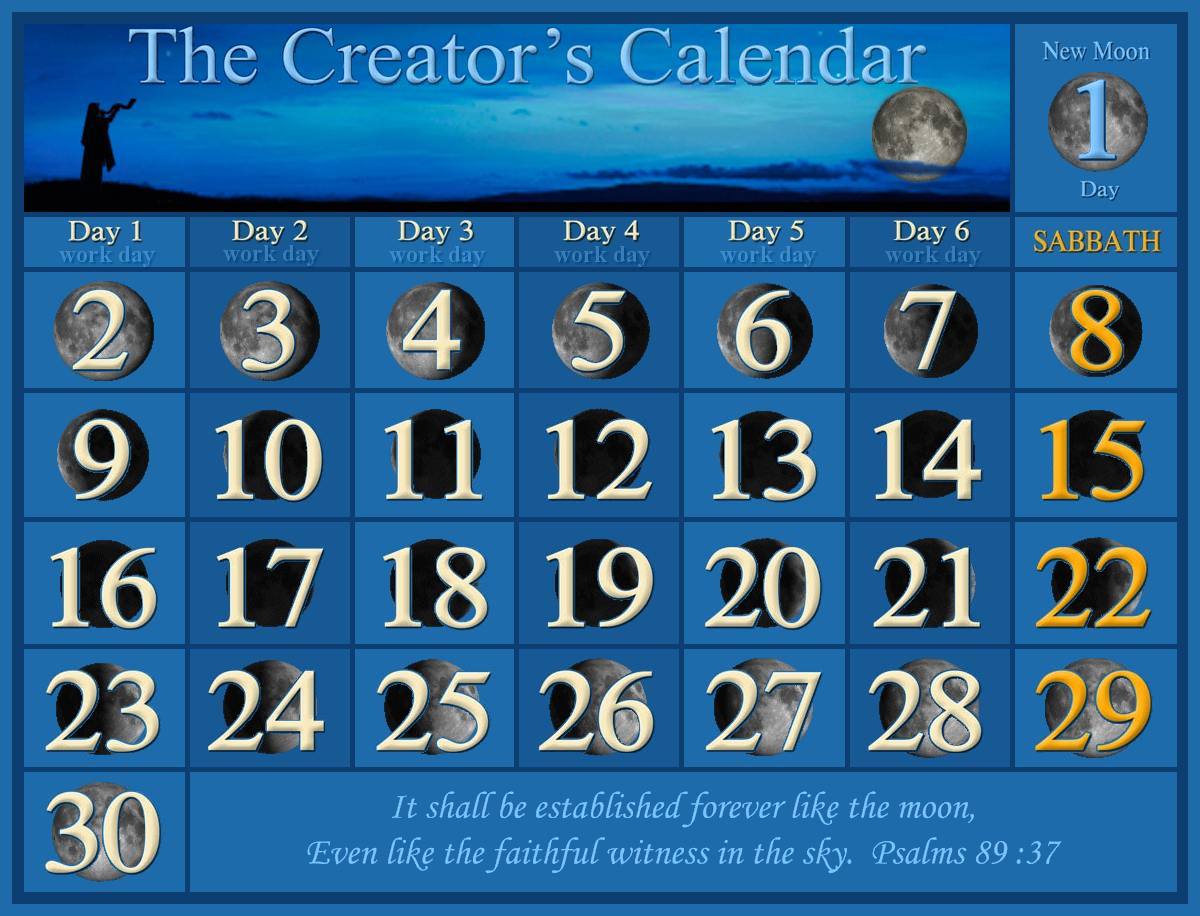 The Creator's Scriptural Calendar, Showing Sabbaths On The 8th, 15th, 22nd, And 29th Days Of The Month.
(Click image to enlarge).
The Creator's Scriptural Calendar, Showing Sabbaths On The 8th, 15th, 22nd, And 29th Days Of The Month.
(Click image to enlarge).
Scripture supports this calendar format. It is significant that every time in Scripture a date is given for a Seventh-Day Sabbath, either directly or contextually, it always falls on the 8th, 15th, 22nd or 29th. This confirms that the Scriptural Biblical calendar uses a lunar month which always starts with 'New Moon'. Work days and seventh-day Sabbaths always fall on the same dates of the month. Moreover, on the Scriptural lunar calendar of creation, the month can never have less than 29 days, or more than 30 days. For an in-depth study on the Seventh-Day Sabbath of Scripture, be sure not to miss this fact-based article: 'The Lunar Calendar Of The Scriptural Sabbath'.
OBJECTION: The moon was created on the fourth day. Obviously, it cannot determine the Sabbath because it was not created until Day Four of Creation.
(Genesis 1:14-19) (KJV) 14And the CREATOR said, Let there be lights in the firmament of the heaven to divide the day from the night; and let them be for signs, and for seasons, and for days, and years: 15And let them be for lights in the firmament of the heaven to give light upon the earth: and it was so. 16And the CREATOR made two great lights; the greater light to rule the day, and the lesser light to rule the night: he made the stars also. 17And the CREATOR set them in the firmament of the heaven to give light upon the earth, 18And to rule over the day and over the night, and to divide the light from the darkness: and the CREATOR saw that it was good. 19And the evening and the morning were the fourth day.
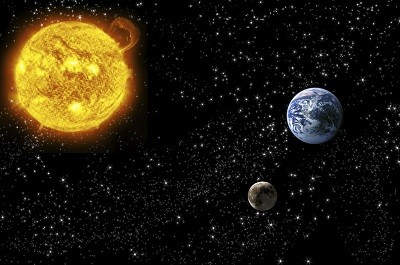
Earth, Sun, Moon, And Stars.
ANSWER: This argument is as much an argument against Saturday as it is against a lunar Sabbath. Saturday is found only in the late Julian calendar [a pagan calendar], and the modern Gregorian calendar [a papal calendar]. Both the Julian and the Gregorian calendars are solar calendars. If the lights were created on the fourth day and cannot be used for time-keeping, than Saturday must be dismissed as well, because the Gregorian calendar is based upon the sun.
The fact is, both the sun and the moon were created by a fiat of Creation. The ETERNAL created age into everything. Adam and Eve are perfect examples of created age. Adam was not created to be a fetus or a new born baby, but a fully-grown man. Likewise, the birds and animals were not created as unhatched eggs or blind, needy baby animals.
Just as when a jeweler sets a watch to the proper time, the Creator properly positioned the moon to accurately keep track of all time to come. When the CREATOR created the sun, He positioned it in a precise location: the exact distance from earth needed to provide the correct temperature; not too close, and not too far. He just as carefully and deliberately placed the moon in the precise position needed in order to operate His time-keeping system.
Moreover, trying to negate the lunar calendar because it was not created until the 4th day, also negates the Scriptural command that clearly defines their role as the time-keeping devices they were created to be: [let them be for signs, and for seasons, and for days, and years].

The 'Full Moon' Is The 'New Moon' Of The Lunar Calendar.
OBJECTION: My [minister, pastor, priest, rabbi] told me that the [lunar or luni-solar] calendar was used only for the Feasts, but NOT the Seventh-Day Sabbath.
ANSWER: Hebrew Scripture teaches only one method of time calculation: the luni-solar calendar:
(Genesis 1:14-19) (KJ21) 14And the CREATOR said, Let there be lights in the firmament of the heaven to divide the day from the night; and let them be for signs and for seasons, and for days and years; 15and let them be for lights in the firmament of the heaven to give light upon the earth; and it was so. 16And the CREATOR made two great lights: the greater light to rule the day, and the lesser light to rule the night. He made the stars also. 17And the CREATOR set them in the firmament of the heaven to give light upon the earth, 18and to rule over the day and over the night, and to divide the light from the darkness. And the CREATOR saw that it was good. 19And the evening and the morning were the fourth day.
(Exodus 31:13) (KJV) Speak thou also unto the children of Israel, saying, Verily My Sabbaths ye shall keep: for it is a sign between me and you throughout your generations; that ye may know that I am the SOVEREIGN that doth sanctify you.
(Exodus 31:16-17) (KJV) 16Wherefore the children of Israel shall keep the Sabbath, to observe the Sabbath throughout their generations, for a perpetual covenant. 17It is a sign between Me and the children of Israel for ever: for in six days the CREATOR made heaven and earth, and on the seventh day He rested, and was refreshed.
(Leviticus 23:1-4) (KJV) 1And the ETERNAL spake unto Moses, saying, 2Speak unto the children of Israel, and say unto them, Concerning the Feasts of the ETERNAL, which ye shall proclaim to be Holy Convocations, even these are my Feasts. 3Six days shall work be done: but the seventh day is the sabbath of rest, an holy convocation; ye shall do no work therein: it is the sabbath of the ETERNAL in all your dwellings. 4These are the Feasts of the ETERNAL, even holy convocations, which ye shall proclaim in their seasons.
(Psalms 104:19) (KJV) He appointed the moon for seasons: the sun knoweth his going down.
Looking at the Hebrew words and definitions behind the following English words found in the above Scriptures we see that; 'signs' is the Hebrew word 'owth' [Strongs #H226] meaning signal, distinguishing mark, remembrance, token, ensign, standard, miracle, and proof. The English words 'seasons' and 'Feasts' are the same Hebrew word 'mow-ed' [Strongs #H4150] meaning appointed time, sacred season, and set feast. The English words 'made' and 'appointed' are the same Hebrew word 'asah' [Strongs #H6213] meaning to appoint, ordain, institute, and bring about. So what we have here, is undeniable language that the [SEVENTH-DAY] Sabbath is a sacred assembly, a distinct appointed and ordained set feast of the ETERNAL, occurring at an appointed time, in a sacred season which is governed by the MOON.
"Mo'ed" is also translated "seasons" in Psalm 104:19. This clearly establishes that the moon was created for the express purpose of calculating the times of worship. The feasts (mow'ed) of the ETERNAL are all outlined in Leviticus 23, and the very first feast listed is the Seventh-Day Sabbath.
(Leviticus 23:1-3) (KJV) 1And the ETERNAL spake unto Moses, saying, 2Speak unto the children of Israel, and say unto them, Concerning the feasts of the CREATOR, which ye shall proclaim to be holy convocations, even these are My feasts. 3Six days shall work be done: but the seventh day is the Sabbath of rest, an holy convocation; ye shall do no work therein: it is the sabbath of the ETERNAL in all your dwellings.
Scripture does not present two calendars: one for the Seventh-Day Sabbath, and another for the annual feasts. Furthermore, it should be remembered that when the moon was appointed the work of establishing worship times, there were no other Feasts. The first Feast was ordained only after the six Days of Creation were completed, and was simply called the Seventh-Day. The first time the word 'Sabbath' appears in scripture is (Exodus 16:23).
OBJECTION: The Feast of Tabernacles proves that sometimes the seventh-day Sabbath falls on a date other than the 8th, 15th, 22nd or 29th. In this passage, the Seventh-Day Sabbath falls on the 23rd after the last day of Feast of Tabernacles on the 22nd!
ANSWER: The Feast of Tabernacles is one of the proofs in favor of a lunar-calculated Seventh-Day Sabbath, because it clearly links the Seventh-Day Sabbath to the 22nd day of the seventh month.
The Feast of Tabernacles is a seven-day feast starting on a Seventh-Day Sabbath, followed immediately by the next Seventh-Day Sabbath, which in Leviticus 23 is called a holy convocation:
(Leviticus 23:34-36) (KJV) 34Speak unto the children of Israel, saying, The fifteenth day of this seventh month shall be the feast of tabernacles for seven days unto the ETERNAL. 35On the first day shall be an holy convocation: ye shall do no servile work therein. 36Seven days ye shall offer an offering made by fire unto the ETERNAL: on the eighth day shall be an holy convocation unto you; and ye shall offer an offering made by fire unto the ETERNAL: it is a solemn assembly; and ye shall do no servile work therein.
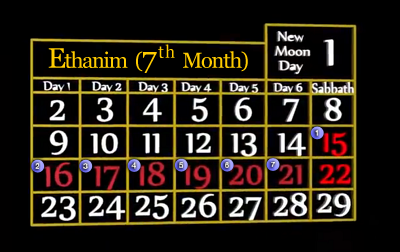
The Feast Of Tabernacles Is A Seven Day Feast,
Beginning On The 15th And Ending On The 21st.
The Feast of Tabernacles always begins on the 15th day of the seventh month, a Seventh-Day Sabbath. It is a seven day feast ending the 21st of the month, making the very next day, the 22nd, a Seventh-Day Sabbath.
Some people have assumed that this Sabbath had to have fallen on the 23rd of the seventh month. However, this erroneous assumption is based upon an incorrect understanding of "the last day, the great day" of the Feast of Tabernacles. As explained in Leviticus 23, the last day of Feast of Tabernacles is the 21st of the seventh month, because it is only a seven day feast which begins on the 15th, a Seventh-Day Sabbath.
OBJECTION: But where does it explain the calendar in the Bible? Give me a text, just one text, that explains how the calendar worked.
ANSWER: This seems like a reasonable request. But is it consistent with Scripture? There are a number of things in the Bible that cannot be proven from a single text. The student of Scripture must ask: What is the weight of evidence?
When all texts are brought together on the subject, what is the conclusion of the matter? There is not a single verse in the Bible explaining the luni-solar calendar format because it was common knowledge. All nations originally used a luni-solar calendar.
A common assumption made by many is that the Julian week in the first century BC and AD was identical to the modern week, starting on Sunday; ending on Saturday. Archeological and historical evidence establish without a doubt that the early Julian week was an eight-day week. When the pagan seven-day planetary week was finally accepted by the Romans in the first centuries AD, it began on Saturn's day and ended on Venus' Day, or, the modern Friday:
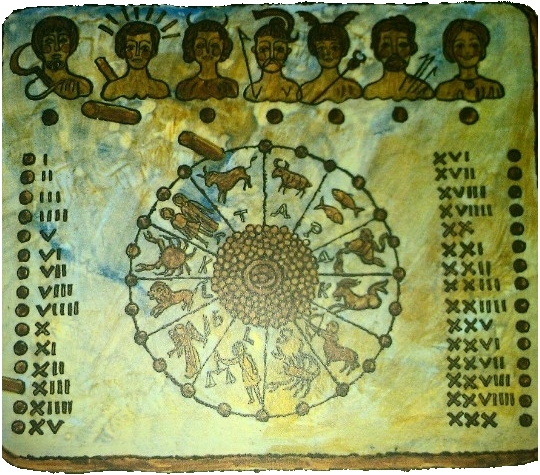
On this early Roman stick calendar, Sunday is shown as the 2nd day of the Roman week. The date shown by the position of the pegs is Sunday, the thirteenth day of the month of May [Taurus].
Above is the Seven-Day cycle of the revised Roman Calendar. On this calendar Saturday is the 1st day of the Roman week and is illustrated as the Sickle which symbolized Saturn. With Saturday as the 1st day of the Roman week, Sunday is demonstrated as the 2nd day, and is illustrated by the Sun Rays.
OBJECTION: Obviously Saturday is the true Seventh-Day Sabbath. That's when the Jews worship and they have never lost the Sabbath.
ANSWER: It is true that the Jews today worship on Saturday. It is also true that they have never lost the concept, of a Seventh-Day Sabbath. However, by their own admission, they deliberately set aside the Scriptural Biblical calendar calculated by observing the New Moon.

Rabbi Louis Finkelstein.
"The New Moon is still, and the Sabbath originally was, dependent upon the lunar cycle." ("Holidays," Universal Jewish Encyclopedia, p. 410.)
"Declaring the new month by observation of the new moon, and the new year by the arrival of spring, can only be done by the Sanhedrin. In the time of Hillel II [4th century A.D.], the Romans prohibited this practice. Hillel II was therefore forced to institute his fixed calendar." ("The Jewish Calendar; Changing the Calendar," www.torah.org.)
Rabbi Louis Finkelstein, a well-known scholar from the Jewish Theological Seminary of America, emphatically stated: "The present Jewish calendar was fixed in the fourth century". (Letter by Louis Finkelstein, Jewish Theological Seminary of America, to Dr. L. E. Froom, Feb. 20, 1939).
Maimonides, a Medieval Jewish scholar, and most other Jewish chronologers agree that the modern Jewish calendar is based upon the "mean motions of the sun and moon, the true [calendar] having been set aside." (Maimonides, Kiddusch Ha-hodesch.)
The fact that Jews today worship on Saturday is NO evidence that Saturday is the Seventh-Day Sabbath of Scripture and should not be used as proof of anything except a change of calendar.
OBJECTION: "On a lunar calendar, you sometimes get eight or nine days between Sabbaths. Obviously this is wrong, because the Sabbath is to come every seventh day."
ANSWER: The fourth commandment plainly states that the Seventh-Day Sabbath comes after six days of labor. Any other teaching or ideology on the Seventh-Day Sabbath is merely a theory, supposition, or assumption:
(Exodus 20:8-11) (KJV) 8Remember the Sabbath day, to keep it holy. 9Six days shalt thou labour, and do all thy work: 10But the seventh day is the Sabbath of the ETERNAL thy CREATOR: in it thou shalt not do any work, thou, nor thy son, nor thy daughter, thy manservant, nor thy maidservant, nor thy cattle, nor thy stranger that is within thy gates: 11For in six days the CREATOR made heaven and earth, the sea, and all that in them is, and rested the seventh day: wherefore the CREATOR blessed the Sabbath day, and hallowed it.
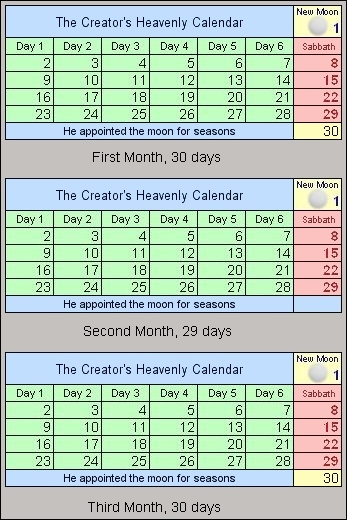
Three consecutive lunar months.
The Hebrew Scriptural Biblical month [or lunation], always starts with the New Moon, and contains only days. The concept of an uninterrupted continuous weekly cycle is strictly a man-made invention, which completely ignores the New Moon of scripture. The New Moon is always the first day of the month. It is not a work day. It is not a Seventh-Day Sabbath. Following New Moon day, there are four groupings of six days of labor followed by a Seventh-Day Sabbath. Because a lunar month can consist of either 29 or 30 days, based upon any particular lunation, you can clearly see that there is no such thing as an 'Unbroken Chain Of Consecutive Seven-Day WEEKS Since Creation'. This is a myth fabricated solely to justify the use of the current solar-based, Jewish and Gregorian calendars.
"Originally, the New Moon was celebrated in the same way as the Sabbath; gradually it became less important while the Sabbath became more and more a day of religion and humanity, of religious meditation and instruction." ("Holidays," Universal Jewish Encyclopedia, p. 410.)
As you can clearly see, the ETERNAL recognizes three distinct types of days on His Scriptural lunar calendar:
(Ezekiel 46:1) (KJV) Thus saith the ETERNAL CREATOR; The gate of the inner court that looketh toward the east shall be shut the six working days; but on the Sabbath it shall be opened, and in the day of the New Moon it shall be opened.
New Moons are frequently classed with Sabbaths in Scripture as being worship days. Because New Moons are worship days, there are never more than six working days before the next day of worship. On the modern solar calendar, New Moons are not even noticed, let alone observed as a worship day on modern-day calendars. And yet, New Moon Day, the day of worship which forms the foundation for Biblical lunar time-keeping, will still be kept in the new earth throughout all eternity:
(Isaiah 66:23) (KJV) And it shall come to pass, that from one New Moon to another, and from one Sabbath to another, shall all flesh come to worship before me, saith the ETERNAL.
If we are going to be worshipping the Creator on every New Moon throughout eternity, should we not worship Him on those days now?
OBJECTION: The seventh-day Sabbath based on the CREATOR's Lunar month is just so hard to understand. The ETERNAL would not make His most important feast day this hard to understand.
ANSWER: The difficulty comes when we are required from birth, to memorize the pagan names of false 'gods' for the days and the months the CREATOR simply numbers. While feast days and certian months bear special names, all other days and months He simply refers to by number:
(Leviticus 23:2) (KJV) Speak unto the children of Israel, and say unto them, Concerning the feasts of the ETERNAL, which ye shall proclaim to be holy convocations, even these are My feasts.
(Leviticus 23:3) (KJV) Six days shall work be done: but the seventh day is the Sabbath of rest, an holy convocation; ye shall do no work therein: it is the Sabbath of the ETERNAL in all your dwellings.
(Leviticus 23:4) (KJV) These are the feasts of the ETERNAL, even holy convocations, which ye shall proclaim in their seasons.
(Leviticus 23:5) (KJV) In the fourteenth day of the first month at even is the ETERNAL's passover.
(Leviticus 23:6) (KJV) And on the fifteenth day [a seventh-day Sabbath] of the same month is the feast of unleavened bread unto the ETERNAL: seven days ye must eat unleavened bread.
(Leviticus 23:7) (KJV) In the first day [the 15th, a seventh-day Sabbath] ye shall have an holy convocation: ye shall do no servile work therein.
(Leviticus 23:8) (KJV) But ye shall offer an offering made by fire unto the ETERNAL seven days: in the seventh day [the 22nd, a seventh-day Sabbath] is an holy convocation: ye shall do no servile work therein.
There are several places in the Hebrew Scriptures where the [seventh-day Sabbath] is assigned to an actual date. Above we can see two of them; the 15th day is a [seventh-day Sabbath], and again seven days later on the 22nd is a [seventh-day Sabbath]. So in these passages we are told which days in each lunar month, are [seventh-day Sabbaths]. By adding or subtracting seven days from a known [seventh-day Sabbath], we can easily determine with one hundred percent certainty which days each month are a [seventh-day Sabbath]. And as we can see, it is always the 8th, 15th, 22nd, and 29th days of each lunar month, on the only Scripturally ordained calendar instituted by the ETERNAL during creation.
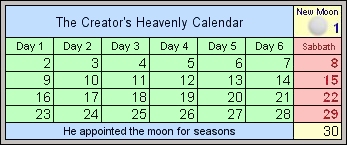
Scripturally Ordained Calendar.
So how do we know that the 15th day of the month, mentioned above, is actually a [seventh-day Sabbath]? Like everything in Scripture you have to go back to the beginning of a subject, and examine ALL of the relevent passages to get to the truth:
(Exodus 16:1-5) (KJV) 1And they took their journey from Elim, and all the congregation of the children of Israel came unto the wilderness of Sin, which is between Elim and Sinai, on the fifteenth day of the second month after their departing out of the land of Egypt. 2And the whole congregation of the children of Israel murmured against Moses and Aaron in the wilderness: 3And the children of Israel said unto them, Would to the ETERNAL we had died by the hand of the ETERNAL in the land of Egypt, when we sat by the flesh pots, and when we did eat bread to the full; for ye have brought us forth into this wilderness, to kill this whole assembly with hunger. 4Then said the ETERNAL unto Moses, Behold, I will rain bread from heaven for you; and the people shall go out and gather a certain rate every day, that I may prove them, whether they will walk in my law, or no. 5And it shall come to pass, that on the sixth day they shall prepare that which they bring in; and it shall be twice as much as they gather daily.
(Exodus 16:9-10) (KJV) 9And Moses spake unto Aaron, Say unto all the congregation of the children of Israel, Come near before the ETERNAL: for he hath heard your murmurings. 10And it came to pass, as Aaron spake unto the whole congregation of the children of Israel, that they looked toward the wilderness, and, behold, the glory of the ETERNAL appeared in the cloud.
(Exodus 16:11-13) (KJV) 11And the ETERNAL spake [on the fifteenth day] unto Moses, saying, 12I have heard the murmurings of the children of Israel: speak unto them, saying, At even [the start of the 16th day] ye shall eat flesh, and in the morning ye shall be filled with bread; and ye shall know that I am the ETERNAL your CREATOR. 13And it came to pass, that at even [the start of the 16th day] the quails came up, and covered the camp: and in the morning [of the 16th day] the dew lay round about the host.
(Exodus 16:21-27) (KJV) 21And they gathered it every morning [the 16th, 17th, 18th, 19th, and 20th days], every man according to his eating: and when the sun waxed hot, it melted. 22And it came to pass, that on the sixth day [the 21st day] they gathered twice as much bread, two omers for one man: and all the rulers of the congregation came and told Moses. 23And he said unto them, This is that which the ETERNAL hath said, Tomorrow is the rest of the Holy Sabbath [the 22nd day] unto the ETERNAL: bake that which ye will bake to day, and seethe that ye will seethe; and that which remaineth over lay up for you to be kept until the morning. 24And they laid it up till the morning, as Moses bade: and it did not stink, neither was there any worm therein. 25And Moses said, Eat that today [the 22nd day]; for today is a Sabbath unto the ETERNAL: today [the 22nd day] ye shall not find it in the field. 26Six days ye shall gather it; but on the seventh day, which is the sabbath, in it there shall be none. 27And it came to pass, that there went out some of the people on the seventh day [the 22nd day] for to gather, and they found none.
While the subject of a different calendar may be difficult to grasp, it is not impossible. The CREATOR's calendar seems difficult because we have spent so many years living by the solar-based Gregorian calendar, a distinctly man-made calendar. A different method of time-measurement is at first, very difficult for us to grasp. However this is the sign between the ETERNAL, and the children of Israel that He uses to test them, whether they will walk in His law, or not:
(Exodus 31:13) (KJV) Speak thou also unto the children of Israel, saying, Verily My Sabbaths ye shall keep: for it is a sign between Me and you throughout your generations; that ye may know that I am the SOVEREIGN that doth sanctify you.
The problem however, is not the proof that the lunar Sabbath is false or not. Rather it merely confirms the truth of Scripture, which foretold that the ETERNAL would allow His true seventh-day Sabbath to be removed:
(Daniel 7:25) (KJV) And he shall speak great words against the most High, and shall wear out the saints of the most High, and think to change times and laws: and they shall be given into his hand until a time and times and the dividing of time.
However the Almighty CREATOR leaves His truth out in plain sight for all those sincerely willing to search for it with all their heart, and with all their soul, and with all their might. Will you determine yourself to study and search for His truth? Will you obey that truth when you find it? Your eternal destiny may hang on the decision you make: to take someone else's word for what is truth; or to study for yourself. Truth is too important to be brushed aside. Once it is presented, a person has an obligation to determine for himself whether or not it is so, and if it is, to obey that truth.
Every once in a while, in everyone's life, they will stumble over the truth, but most will get up, brush themselves off, and hurry on their way, as though nothing had happened. --Winston Churchill
When a man who is honestly mistaken hears the truth, he will either quit being mistaken or cease being honest. --Richard Humpal
Truth does not contradict itself. When all around is confusion and chaos, Truth alone stands unassailable. Everyone has inherited errors and traditions handed down from paganized Christianity. However, Scripture reveals its secrets to every Searcher for Truth. None need remain in confusion and error.
OBJECTION: Lunar Sabbatarians don't count some days of the week. Their calendar is full of extra, uncounted non-days or blank days.
ANSWER: There is no such thing as a non-day or a blank day. All time must be accounted for and the Biblical luni-solar calendar does not leave any time out. Man-made solar calendars, and the luni-solar calendar, both use the rotation of the earth around the sun to calculate the year. Because the solar year is 365.25 days long, the extra time is accounted for on the Gregorian calendar by adding in a leap day. This "leap" day is February 29 and occurs every four years.
Moreover, the solar-based Gregorian calendar uses an arbitary number of days each month based upon mathematical calculation, not observation to lay out it's monthly cycles. Some months have 28 days, and some months have 31 days. In addition, some months have five seven-day periods, commonly referred to as weeks. This goes against the Scripturally ordained calendar based upon the natural cycle observed by the moon.
On Solar calendars, the months are of arbitrary length and are not anchored to anything in nature. The Biblical luni-solar calendar on the other hand, ties its months to the cycles of the moon. A lunation, like the solar year, is not a round number. A lunation contains 29.5 days. Because of this, some months have 29 days and other months have 30 days. There can never be 28 days, or 31 days in the natural monthly lunar cycle.
On a lunation of 30 days, the 30th day comes between the last Seventh-Day Sabbath of the month and the next month's New Moon day. It is not part of the seven-day cycle, but neither is it a blank day. It has a date within the monthly cycle.
OBJECTION: On the lunar calendar, the Sabbath floats around. Each month the Seventh-Day Sabbath occurs on different days of the week. Sometimes it is on Monday, then the next month it changes to Wednesday and after that to Thursday. It is never consistent.

The Creator'S Calendar, Showing Sabbaths On
The 8th, 15th, 22nd, And 29th Days Of The Month.
It is only the difference in the so-called weekly cycles that makes the lunar-based Sabbath appear to float from month to month on the Gregorian calendar. Whenever man tries to devise his own calendar that goes against the grain of the natural cycle, this is to be expected.
In contrast, the Biblical lunar calendar is very constant. Because the seven-day cycle of the Biblical calendar restarts with the New Moon, the dates for the Sabbath always fall on the same days of the month. Far from floating around, the true Biblical Sabbath is very consistent and always falls on the 8th, 15th, 22nd and 29th days of the lunar month.
This is not so on the Gregorian solar calendar. The Seventh-Day Sabbath floats from date, to date, to date each month all through the year.
OBJECTION: New Moons cannot be Sabbaths simply because the Bible gives numerous examples of people traveling or working on New Moons.
ANSWER: It is true that the Bible gives examples of people traveling or constructing the tabernacle on New Moons. This is because New Moons are not Seventh-Day Sabbaths, nor are they work days. The various prohibitions against travel and cooking on the Seventh-Day Sabbath do not apply to New Moon days.
However, New Moon days are worship days. They are a time of rejoicing and thanksgiving for the blessings of the past month and renewed consecration for the upcoming month. This is demonstrated in the record of required sacrifices listed in (Numbers 28-29). The days with the least amount of required sacrifices were common work days. The Seventh-Day Sabbath had more sacrifices required than ordinary work days. New Moon days had even more sacrifices required than for the Seventh-Day Sabbath. Only the annual feasts had more required daily sacrifices than New Moons.
New Moons are in a class of worship day all by themselves. Scripture also presents New Moons as a time of worship in the future time of the third temple to come:
(Ezekiel 46:1) (KJV) Thus saith the ETERNAL CREATOR; The gate of the inner court that looketh toward the east shall be shut the six working days; but on the sabbath it shall be opened, and in the day of the new moon it shall be opened.
(Isaiah 66:23) (KJV) And it shall come to pass, that from one new moon to another, and from one sabbath to another, shall all flesh come to worship before me, saith the ETERNAL.
All who desire to worship the ETERNAL CREATOR will do so at the appointed times designated for worship, based upon His Scriptural lunar calendar.
OBJECTION: This lunar Sabbath idea contradicts itself. If this theory were true, it means that the Exodus would have occurred on a lunar Sabbath, thus breaking the Sabbath.
ANSWER: It is true that the Israelites left Egypt on the 15th day of the First month. However they did not break the Sabbath, because the holy hours were already over by the time they left. The Biblical record provides two important clues to the timing of the Exodus. Numbers provides the date of the Exodus:
(Numbers 33:3) (KJV) And they departed from Rameses in the first month, on the fifteenth day of the first month; on the morrow after the passover the children of Israel went out with an high hand in the sight of all the Egyptians.
Deuteronomy 16 reveals that this occurred at night:
(Deuteronomy 16:1) (KJV) Observe the month of Abib, and keep the passover unto the ETERNAL thy CREATOR: for in the month of Abib the ETERNAL thy CREATOR brought thee forth out of Egypt by night.
The date of the Exodus was the 15th of Abib, the first month, on the day after the Passover. Within a lunar month, the 15th is always a Seventh-Day Sabbath. However, the Israelites left at night, after the sacred hours of the Sabbath were past. It must be remembered that the ETERNAL is the Law-giver. Just as truth does not contradict itself, the ETERNAL who Himself IS Truth, never breaks His own laws.
OBJECTION: Saturday has always been the Seventh-Day Sabbath. In fact, the word 'Sabbath' has been preserved in many languages and it always designates the seventh-day Saturday.
ANSWER: The fact that the word Sabbath appears in many languages is not proof that Saturday is the Biblical Sabbath. All it proves is the wide-spread dissemination of paganized Christianity. Saturday, like the continuous seven-day cycle, is a fairly recent addition to the calendar.
When Julius Caesar set aside the luni-solar calendar of the Roman Republic, and adopted a straight solar calendar, his Julian calendar had a week of eight days, designated A through H.

A Reconstruction Of Fasti Antiates, The Only Calendar Of The Roman Republic Still In Existence. (Palazzo Massimo Alle Terme, ed. Adriano La Regina, 1998. Circa 60 BC.) See This Page for Calendar Details.
(Click image to enlarge).
As the Persian mystery cult of Mithraism gained popularity in Rome, the pagan planetary week was adopted. This was a seven-day week beginning on dies Saturni, or Saturn's day. The second day of the week was dies Solis, or Sun's Day. The third day of the week was dies Lunae, or Moon's day. The week ended on dies Veneris, or Venus' Day which is the modern Friday.
Roman adoption of Mithraism is directly responsible for the abandonment of the eight-day Julian week, and the adoption of the seven-day planetary week:
It is not to be doubted that the diffusion of the Iranian [Persian] mysteries has had a considerable part in the general adoption, by the pagans, of the week with the Sunday as the holy day. The names which we employ, unawares, for the other six days, came into use at the same time that Mithraism won its followers in the provinces in the West, and one is not rash in establishing a relation of coincidence between its triumph and that concomitant phenomenon. (Robert L. Odom,Sunday in Roman Pagansim, p. 157.)
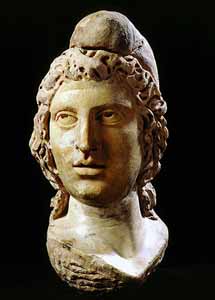
Roman Statue of Mithra.
Mithraism was a sun cult. Consequently, the Day of the Sun became more and more important. The pre-eminence assigned to the dies Solis [day of the Sun] also certainly contributed to the general recognition of Sunday as a holiday. This is connected with a more important fact, namely, the adoption of the week by all the European nations. (Franz Cumont, Astrology and Religion Among the Greeks and Romans, p. 163.)
The seven day planetary week was named after the planetary 'gods'. As this week spread throughout Europe, the names of the days of the week spread with it. Many languages today show Roman Catholic influence by renaming the first day of week, Sunday, the "lord's day" and Saturday, the seventh-day of the week, "Sabbath." However, those are NOT the original names of the days of the week.
The astrological influence is obviously even more pronounced around the fringes of the Roman Empire, where Christianity arrived only much later. English, Dutch, Breton, Welsh, and Cornish, which are the only European languages to have preserved to this day the original planetary names of all the seven days of the week, are all spoken in areas that were free of any Christian influence during the first centuries of our era, when the astrological week was spreading throughout the Empire. (Eviatar Zerubavel, The Seven Day Circle: The History and Meaning of the Week, p. 24.)
Saturday, like the pagan Julian calendar that adopted it in the first centuries AD, is irreparably pagan. It is not the true Biblical Seventh-Day Sabbath and no amount of renaming it "the Sabbath" can transform it into being the true Bible Sabbath.
The pagan names of the planetary week have been perpetuated in the calendar in use among the so-called Christian nations. Every time we look at the calendar we have before us a constant reminder of the amalgamation of paganism and Christianity that took place in the early centuries of the Christian church, and made the modern Babel of conflicting sects and creeds which constitutes today's pagan [New Testament]™.
OBJECTION: The lunar cycle makes a person break the real unbroken Seventh-Day Sabbath that goes back to Creation.
ANSWER: It is an assumption, based on long practice, that the so-called week has cycled without interruption ever since Creation. However, the modern so-called week comes directly from paganism. From the names of the days of the so-called week, to the continuous seven-day cycle, the pagan origins of the modern so-called week can be traced. The fallacy of the continuous seven-day cycle is further demonstrated by today's man-made International Date Line.

Emperor Constantine The Great.
The only resemblance to the Biblical six work days and seventh-day Sabbath, is found in the number of days within the so-called week. Both have seven days. However, the modern so-called week is a Satanic deception specifically designed to counterfeit the Biblical six work days and seventh-day Sabbath. The modern so-called week, beginning on Sunday and ending on Saturday, was standardized at the Council of Nicaea in the fourth century A.D.
Counterfeit worship requires a counterfeit calendar and the Council of Nicaea provided it. Biblical calendation was supplanted by pagan solar calendation, and the planetary so-called week replaced the Biblical six work days and seventh-day Sabbath which depended upon the moon. (eLaine Vornholt & L. L. Vornholt-Jones, Calendar Fraud, p. 53.)
This planetary so-called week was paganism's counterfeit of the true, Biblical six work days and seventh-day Sabbath instituted by the Creator in the beginning of Earth's history. In the counterfeit so-called week employed in ancient paganism "the venerable day of the Sun" was esteemed by the heathen above the other six days because it was regarded as sacred to the Sun, the chief of the planetary deities. Just as the true Sabbath is inseparably linked with the Biblical six work days and seventh-day Sabbath, so the false Sabbath [Saturday] of pagan origin needed a seven-day cycle. Thus we have found that the planetary so-called week of paganism is Sunday's twin sister, and that the two counterfeit institutions were linked together. (Robert L. Odom, Sunday in Roman Paganism, pp. 243-244.)
OBJECTION: The conflict between Sunday keeping and Sabbath keeping has always been against the day commonly known as 'Saturday.' There is no record of a conflict between Sunday and a floating Sabbath nor is there any record of Christians ever using a different calendar.
ANSWER: This is not true and the historical record proves it. The transition from worshipping by the Biblical calendar, to full acceptance of the pagan calendar, was not an event that occurred overnight or even within a single life-time. It was a process of a creeping compromise over the course of centuries. As soon as some Christians began to apostatize, embracing various aspects of paganism, other Christians stood firm for the truth, unbending in the face of severe opposition. In fact, the centuries-long murderous military campaigns [the Crusades], sanctioned by the Latin Roman Catholic Church, bears this out.
At every step in the course of the apostasy, at every step taken in adopting the forms of sun worship, and against the adoption and the observance of Sunday itself, there had been constant protest by all real Christians. Those who remained faithful to the truth of the pure word of the Hebrew Scriptures, observed the Sabbath of the ETERNAL CREATOR according to the commandment, which sets forth the Sabbath as the sign by which the ETERNAL CREATOR of the heavens and the earth, is distinguished from all other false 'gods'. These accordingly protested against every phase and form of sun(day) worship. Others compromised, especially in the east, by observing both the lunar Sabbath and Sunday. But in the west, under Roman influences and under the leadership of the church and the bishopric of Rome, Sunday alone was adopted and observed. (A. T. Jones, The Two Republics, pp. 320-321.)
This creeping compromise by Christians with some worshipping on both the lunar Sabbath and Sunday, others on Saturday and Sunday, and some on Sunday alone, caused great confusion among the pagan Mithraists.
Tertullian, an early Christian writer, admitted this fact. He clearly stated that Christians who worshipped on Saturn's day as the seventh day of the so-called week were themselves deviating from an Israelite custom of which they were ignorant.
We shall be taken for Persians [Mithraists] perhaps. The reason for this, I suppose, is that it is known that we pray towards the east. Likewise, if we devote the day of the Sun to festivity (from a far different reason from Sun worship), we are in a second place from those who devote the day of Saturn, themselves also deviating by way of a Jewish custom of which they are ignorant. (Tertullian, Apologia.)

A Stick Calendar Found At The Baths Of Titus Depicting Saturday (Or Dies Saturni - The Day Of Saturn) As The First Day Of The Pagan Planetary so-called week (79 - 81 A.D.).
The custom of worshipping on Saturn's day, the seventh day of the so-called week, once it was bumped from the first day to the last, was based on the Israelite custom of worshipping on the Seventh-Day Sabbath. However, Saturday itself was not the Hebrew Sabbath as the so-called weekly cycles were different.
Additional evidence of Christians using both the Biblical calendar and the pagan Julian calendar can be found in various early inscriptions on sepulchers. One of the oldest sepulchral inscriptions dates from A.D. 269. It states:
In the consulship of Claudius and Paternus, on the Nones of November, on the day of Venus, and on the 24th day of the lunar month, Leuces placed [this memorial] to her very dear daughter Severa, and to Thy Holy Spirit. She died [at the age] of 55 years, and 11 months [and] 10 days. (E. Diehl, Inscriptiones Latinae Selectae Verteres, p. 193.)
This is amazing confirmation of early Christian use of lunar months. The "Nones" of November is November 5 which, that year fell on the day of Venus, or Friday. However, the 24th day of the lunar month falls on the second day of the so-called week.
The facts of history reveal Saturday to be nothing more than a day on the pagan planetary so-called week, honoring the blood-thirsty planetary 'god' Saturn. The wide-spread acceptance of tradition has led many to assume that their beliefs are based solely on Scripture, when in fact, many beliefs are merely ancient customs handed down from old pagan beliefs.
Each of us has a solemn responsibility to study every belief for themselves. Let no one take a stand against the truth of the Biblical calendar, until a thorough study of the subject has been made. Scripture warns against anyone taking a hasty and dogmatic stance prior to searching for truth:
(Proverbs 18:13) (KJV) He that answereth a matter before he heareth it, it is folly and shame unto him.
The Sabbath, which is the sign of loyalty to the CREATOR, is of paramount importance to everyone living on earth.
In recent years, the knowledge of the CREATOR's lunar calendar and the Seventh-Day Sabbath calculated by that calendar, has grown and spread. Various objections have been raised against this truth. However, when these objections are carefully analyzed in the light shining from Scripture and the historical record, the facts support that the true Biblical Sabbath can only be found by using the luni-solar calendar of Creation. All other worship days, calculated by all other calendars, are counterfeits.
OBJECTION: The luni-solar calendar might work well in a perfect climate if you're living near the equator. However, it does not work if you live near the North or South poles.
ANSWER: The beauty of the CREATOR's calendar is that it is as perfect for the North or South poles as it is for the equator.

Sun At The North Pole.
The new year on the luni-solar calendar begins in the spring which is roughly midway between the extremes of summer and winter, even in the arctic regions. Once the astronomical principles of luni-solar calendation are understood, the lunar calendar for the year begins with the New Moon of the first month of Abib, in the Spring.
Because lunar months are 29.5 days long, a person can observe on average every other month being a 30 day month, with all other months being 29 day months. This is probably how the early commandment-following Christians did it when they were forced to hide in the catacombs or were enslaved in the mines and unable to see the sky.
Because the New Moon can be determined with great accuracy through observation, worship by the luni-solar calendar in the arctic regions is not a problem, either. Similar to what a Saturday-Sabbatarian does on the Gregorian calendar, Lunar-Sabbatarians can keep seventh-day Sabbaths every 8th, 15th, 22nd, and 29th day of the lunar month just as easily. The calendar of Creation is the most user-friendly calendar in existence and can be accurately used by all, regardless of where they live.
OBJECTION: The Jewish Talmud clearly does not support a lunar Sabbath. It refers to what prayers are to be said (If a New Moon falls on a Sabbath), and has special instructions for Passover (If the sixteenth falls on the Sabbath). Such statements could not be made if in fact, the Jews were worshipping on the Scripturally-based Biblical lunar Sabbath, because according to the Scriptural lunar calendar, neither New Moons nor the 16th of the month ever falls on a Seventh-Day Sabbath.

Jewish Rabbi.
ANSWER: The Talmud was written after the destruction of Jerusalem in AD 70. While certain elements may accurately reflect Biblical truth, such points can only be established when compared with other Scriptural evidence.
This is an extremely important point because the calendar used by Jews today to calculate their feasts is a corrupted alteration of the original calendar. It was devised by the Pharisees and they justified this change by their oral traditions.
To use the Talmud to somehow "prove" the luni-solar calendar false, proves nothing of the sort. All that is established is that the traditions of the Pharisees triumphed thanks to Constantine and Hillel. Pharasaism became Talmudism [but], the spirit of the ancient Pharisee survives unaltered. When the Jew studies the Talmud, he is actually repeating the arguments used in the Palestinian academies. The spirit of the [Pharisees'] doctrine has remained quick and vital. (Louis Finkelstein, The Pharisees: The Sociological Background of their Faith, [Jewish Publication Society of America], Vol. 4, p. 1332.)
Modern Jewish scholars base their beliefs on the Talmud, which in turn, comes straight from the doctrines of the Pharisees. Basing a belief on the Talmud is to base one's belief on the traditions of men, and not the Hebrew Scriptures.
OBJECTION: The word [week] comes from the word seven. Obviously, this refers to a repeating cycle of seven days. Besides, Saturday is when the Jews worship.
ANSWER: The Hebrew word shabuwa means literally, "sevened" because the Hebrew Biblical six work days and seventh-day Sabbath was seven days long. It was translated into English as [week]. Various cultures throughout time have had so-called [weeks] of differing lengths.
Various parts of Africa had three, four, five, six and eight day so-called weeks, centered around market days. In fact in the Congo, the word for "week" is the same as the word for "market".
The Maya of the Yucatan had clusters of five-day so-called weeks. The Muyscas of South America had a three-day so-called week while the Chibchas had a four-day so-called week.
The Etruscans and Romans had eight-day so-called weeks, while the Egyptians and the Revolutionary French had 10-day so-called weeks.
However, Nothing in the definition of the word "shabuwa", refers to a continous unbroken cycle of seven-day weeks. Anciently, all seven-day cycles restarted at the New Moon. The fact that the modern so-called week is a continuous seven-day cycle can be attributed to a variety of factors, but NOT to the original calendar of Creation. One Jewish scholar, a professor at Rutgers University, exulted:
A continuous seven-day cycle that runs throughout history paying no attention whatsoever to the moon and its phases is a distinctively Jewish invention. Moreover, the dissociation of the seven-day so-called week from nature has been one of the most significant contributions of Judaism to civilization; it facilitated the establishment of what Lewis Mumford identified as mechanical periodicity, thus essentially increasing the distance between human beings and nature. Quasi so-called weeks [whose cycle restarts with the New Moon] and the [continuously cycling unbroken seven-day weeks since creation myth] actually represent two fundamentally distinct modes of temporal organization of human life. The former involving Scriptural adaptation to nature, and the latter stressing total emancipation from it. The invention of the continuous unbroken seven-day so-called week since creation myth, was therefore one of the most significant breakthroughs in human beings attempts to break away from being prisoners of nature and create a social world of their own. (Eviatar Zerubavel, The Seven Day Circle: The History and Meaning of the Week, p. 11)
This statement is nothing more than an admission of apostasy. It should be understood in the context of Jewish admission that modern Judaism is the spiritual descendent of the Pharisees whose "traditions" and "adaptions" and "prevarications" deviate from the Hebrew Scriptures. Moreover, it is also a clear faliure of the Jews to believe what the ETERNAL has said concerning His Sacred calendar and time itself:
(Daniel 7:25) (KJV) And he shall speak great words against the most High, and shall wear out the saints of the most High, and think to change times and laws: and they shall be given into his hand until a time and times and the dividing of time.
(Lamentations 2:6) (KJV) And He hath violently taken away His tabernacle, as if it were of a garden: He hath destroyed His places of the assembly: the ETERNAL hath caused the solemn Feasts and Sabbaths to be forgotten in Zion, and hath despised in the indignation of His anger the king and the priest.
OBJECTION: It is impossible to count to 'Pentecost' on the Luni-solar calendar.
ANSWER: The first problem with 'Pentecost', like everything else in the paganized christian bible, the so-called [New Testament]™, invented by Catholic bishops at the Council of Nicaea convened by the Roman Emperor Constantine I in AD 325, the term 'Pentecost' can not be found in the Hebrew Scriptures [the only officially sanctioned scripture of the ETERNAL, the Almighty CREATOR and SOVEREIGN of the universe]. The actual name of this feast is 'the firstfruits of wheat harvest'. Moreover, the only way to correctly count to this fall feast is by using the luni-solar calendar, because only by using the Scriptural Biblical lunar calendar, can all the requirements for calculating the day of the firstfruits, be met.
Before moving on, it must be understood that this is a feast that revolved around the wheat harvest. This time of celebration is known as Shavuot [a word also not found in the Hebrew Scriptures], which is the Jewish word meaning WEEKS. The actual Hebrew word is H7620 'Shabuwa' meaning seven, period of seven (days, months, years). This is one of three separate names that are used in Scripture to refer to this important Israelite feast. Each name emphasizes an important aspect of the feast as well as its religious and cultural significance to both Jews and Christians. Besides being called the 'feast of WEEKS' and 'the firstfruits of wheat harvest' in Exodus 34:22, this special feast celebration is called the 'Day of the Firstfruits' in Numbers 28:26 and the 'Feast of Harvest' in Exodus 23:16. At no time, is the word 'Pentecost' found in the Hebrew Scriptures:
(Exodus 34:22) (KJV) And thou shalt observe the feast of weeks, of the firstfruits of wheat harvest, and the feast of ingathering at the year's end.
(Numbers 28:26) (KJV) Also in the day of the firstfruits, when ye bring a new meat offering unto the ETERNAL, after your weeks be out, ye shall have an holy convocation; ye shall do no servile work...
(Exodus 23:16) (KJV) And the feast of harvest, the firstfruits of thy labours, which thou hast sown in the field: and the feast of ingathering, which is in the end of the year, when thou hast gathered in thy labours out of the field.
The first thing to note here is the absence of the word 'Pentecost'. The only place where you will find the word 'Pentecost' is in the writings of the self-appointed so-called apostle paul, a false apostle in the equally false paganized [New Testament]™. See: (Acts 2:1, Acts 20:16, and 1 Corinthians 16:8).
The second thing to note here, is the fact that this Feast occurs at the year's end. If you count in the usual way to this feast, that is 50 days after the Feast of Unleavened Bread, you wind up in June or July, which is nowhere near the fall wheat harvest at the end of August or mid September. More on this important point in a moment.
The second problem is that when comparing the English translation with the Hebrew of (Leviticus 23:16), you will notice that the translators neglected to translate one of the characters/words. Scripture provides three time parameters that must be met in order to correctly count to this feast. One of these time parameters was never translated, and is found in (Leviticus 23:16):

The Translators Neglected To Translate The Green Characters/Word, 'min'.
(Leviticus 23:15-16) (KJV) 15And ye shall count unto you from the morrow after the sabbath, from the day that ye brought the sheaf of the wave offering; seven sabbaths shall be complete: 16Even unto the morrow after the seventh sabbath shall ye number fifty days; and ye shall offer a new meat offering unto the CREATOR.

From The Above Lexicon Charts, We Can See That 'ad & min', When Appearing Together,
Is Most Accurately Translated As 'From The Morrow'. (Click Image To Enlarge).

The Actual Translation Of 'Unto The Morrow', Should Be, 'From The Morrow'.
The English word 'unto' is H5704 'ad' Which When Used With 'min' Means From.
(See" 'Outline of Biblical Usage'; Definition 'B' under the heading 'prep').
In other words, you shall also count for yourselves from the day after the Sabbath that you bring the Wave-sheaf, seven Sabbaths. They must be complete. Then after the seventh Sabbath, you shall count fifty days. The three restored requirements as set forth in Scripture are:
(Leviticus 23:15-16) (KJV) 15And ye shall count unto you [1] from the morrow after the sabbath, from the day that ye brought the sheaf of the wave offering; [2] seven sabbaths shall be complete: 16[3] FROM the morrow after the seventh Sabbath shall ye number fifty days; and ye shall offer a new meat offering unto the CREATOR.
1. Start the count on Wave Sheaf, the day after the Sabbath.
2. Count the next seven Sabbaths which must be complete.
3. Then count 50 more days, when the wheat harvest is ready.
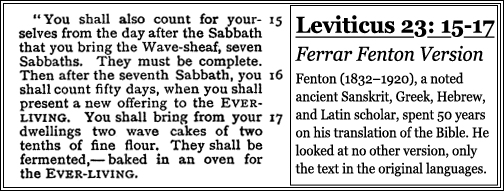
The Correct Reading Of (Leviticus 23:15-17) By Fenton.
Historians and Biblical scholars all agree that the Feast of Firstfruits also stands as a memorial of the giving of the Law on Mt. Sinai. "The feast of Firstfruits was held in remembrance of the giving of the law..." (Matthew Henry Concise)
"The Feast of Firstfruits... when the first-fruits (especially wheat) were presented; commemorative also of the giving of the Law on Mount Sinai." (History Of The Jewish Nation)
(Exodus 19:1) states that the children of Israel arrived on the same day that they had left Egypt, the 15th. Here we have the first seven days in our count to fifty. (Exodus 19:10-16) states that the ETERNAL told Moses to sanctify the people. Three days later, the ETERNAL descended onto Mt. Sinai. Thus we have three more days added to the count, giving us a total of ten days. In (Exodus 24:9-12), the ETERNAL then asks Moses to come up the Mountain with the elders. Moses, Aaron, Nadab, Abihu, and the elders ascend Mt. Sinai. Next in (Exodus 24:15-18) the ETERNAL calls Moses into the mountain. After forty days, Moses descends with the original Tables of Stone written by the finger of the ETERNAL. This adds forty more days, giving us a total of fifty days:
(Exodus 19:1) (KJV) In the third month, when the children of Israel were gone forth out of the land of Egypt, the same day came they into the wilderness of Sinai.
(Exodus 19:10-11) (KJV) 10And the ETERNAL said unto Moses, Go unto the people, and sanctify them to day and to morrow, and let them wash their clothes, 11And be ready against the third day: for the third day the ETERNAL will come down in the sight of all the people upon mount Sinai.
(Exodus 24:9-12) (KJV) 9Then went up Moses, and Aaron, Nadab, and Abihu, and seventy of the elders of Israel: 10And they saw the CREATOR of Israel: and there was under his feet as it were a paved work of a sapphire stone, and as it were the body of heaven in his clearness. 11And upon the nobles of the children of Israel he laid not his hand: also they saw the ETERNAL, and did eat and drink. 12And the ETERNAL said unto Moses, Come up to me into the mount, and be there: and I will give thee tables of stone, and a law, and commandments which I have written; that thou mayest teach them.
(Exodus 24:15-18) (KJV) 15And Moses went up into the mount, and a cloud covered the mount. 16And the glory of the ETERNAL abode upon mount Sinai, and the cloud covered it six days: and the seventh day he called unto Moses out of the midst of the cloud. 17And the sight of the glory of the ETERNAL was like devouring fire on the top of the mount in the eyes of the children of Israel. 18And Moses went into the midst of the cloud, and gat him up into the mount: and Moses was in the mount forty days and forty nights.
If one was to simply count 50 days from the Wave Sheaf offering during Unleavened Bread, then The Feast of Firstfruits would be celebrated well before the children of Israel had even reached Sinai. However, when we use the luni-solar calendar, we see the timeline laid out in Scripture that proves the Biblical and historical account of The Feast of Firstfruits, being a memorial for the giving of the Law.
Seven [lunar] Sabbaths complete will always fall on the 8th of the Third Month. On the day after the seventh Sabbath, the count of fifty days is begun. This will take you to either the 28th or 29th of the Fourth Month depending upon the number of days in the Third Month, or lunation. (See Chart below.) This makes the entire count from Wave Sheaf roughly 100 days, which is what we should expect given that the feast of firstfruits is at the end of summer during the wheat harvest in the early fall, because wheat takes roughly 100-120 days to mature, or about four months.
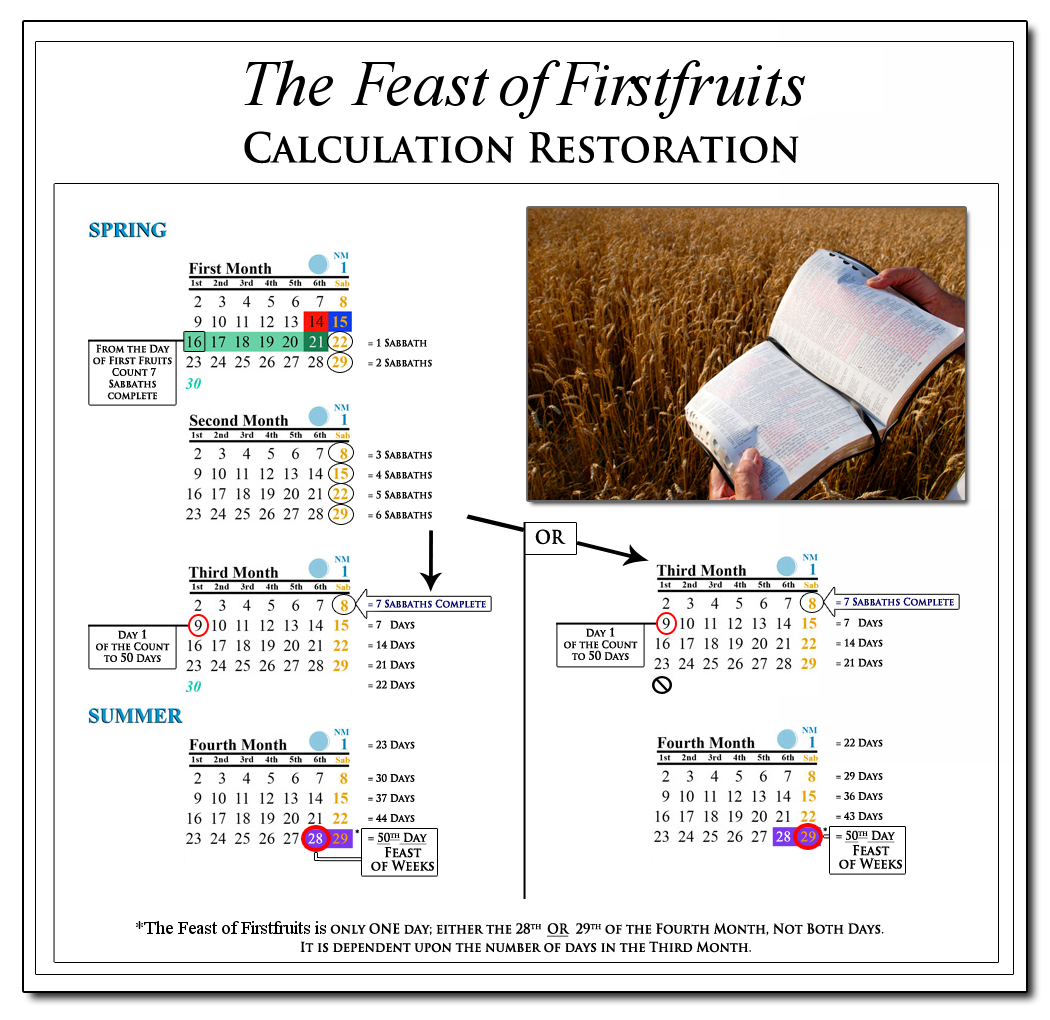
Chart Showing The Count To The Feast Of Firstfruits: 7 Lunar Sabbaths + 50 Days, Counting From Wave Sheaf.
(Click Image To Enlarge).
This was no random feast. This was the Feast of Firstfruits, exactly 50 days after the 7 Sabbaths were complete on the luni-solar calendar. The fact is that only by counting seven complete Sabbaths on the luni-solar calendar and then adding fifty days can one arrive at the Feast of Firstfruits [the true name for this feast]. Far from disproving the lunar Sabbath, the Biblical count to the Feast of Firstfruits is one of the most remarkable proofs in favor of the lunar Sabbath.
OBJECTION: There are so many conflicting ideas for the lunar Sabbath. The ETERNAL is not the author of confusion. If this were true, lunar Sabbatarians would have some unity in their beliefs. As it is, they are very UN-unified, some keeping New Moon on conjunction, others on the LAST visible crescent, some on the FIRST visible crescent, others on the horned crescent and still others on the full moon. All is confusion and so, obviously, this is error.
ANSWER: This is a nonsensical argument. It could be used against all religions, of which there are hundreds of different religious sects, creeds, cults, denominations, and traditions which are not unified on the day of worship, the nature of the Almighty CREATOR, what happens after death, and an entire host of other doctrines. However, the fact that differing opinions are held among those seeking to reestablish lost truths is not an argument against it. Rather, all should be allowed the freedom of thought and the religious liberty to study and find the truth for themselves.
Scriptures declares that the ETERNAL Himself caused the true Sabbath to be forgotten:
(Lamentations 2:5-6) (KJV) 5The ETERNAL was as an enemy: he hath swallowed up Israel, he hath swallowed up all her palaces: he hath destroyed his strong holds, and hath increased in the daughter of Judah mourning and lamentation. 6And he hath violently taken away his tabernacle, as if it were of a garden: he hath destroyed his places of the assembly: the ETERNAL hath caused the solemn Feasts and Sabbaths to be forgotten in Zion, and hath despised in the indignation of his anger the king and the priest.
In Hosea 2, verse 11, the ETERNAL states:
(Hosea 2:11) (KJV) I will also cause all her mirth to cease, her Feast days, her new moons, and her Sabbaths, and all her solemn Feasts.
These appointed times for worship are all calculated on the same luni-solar calendar of Creation. However, the assurance is also given that in the last days all truth is to be restored to those who keep the Sabbath holy:
(Isaiah 58:11-14) (TLB) 11And the ETERNAL will guide you continually, and satisfy you with all good things, and keep you healthy too; and you will be like a well-watered garden, like an ever-flowing spring. 12Your sons will rebuild the long-deserted ruins of your cities, and you will be known as "The People Who Rebuild Their Walls and Cities". 13If you keep the Sabbath holy, not having your own fun and business on that day, but enjoying the Sabbath, speaking of it with delight as the ETERNAL's Holy Day, and honoring the ETERNAL in what you do, not following your own desires and pleasure nor talking idly; 14then the ETERNAL will be your delight, and I will see to it that you ride high and get your full share of the blessings I promised to Jacob, your father. The ETERNAL has spoken.
The process of restoring long buried truths began during the Protestant Reformation and continues to this day in the restoration of the Biblical, Scriptural [lunar or luni-solar] calendar and its restored Seventh-Day Sabbath. It is not easy to dig out long-forgotten truths. It takes time and diligent effort. But the truth is there to be found, and the promise is that it will come to all those sincerely willing to search for it with all their heart, and with all their soul, and with all their might.
OBJECTION: This lunar Sabbath theory is simply a revival of the ancient moon cult, dressed up in modern clothing. It is nothing more than worship of the moon.
ANSWER: ALL time is calculated by movement. Without the movement of the celestial bodies relative to the position of the earth, time cannot be measured.
There are four basic calendars:
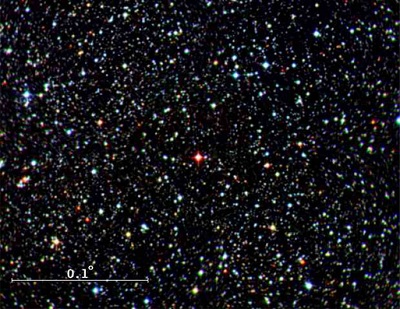
The Sidereal calendar uses the apparent movement of the stars compared to the earth.

Solar calendars use the rotation of the earth about the sun for the year. Months are independent of anything in nature.

Lunar calendars are based strictly on the cycles of the moon. Because the lunar year is shorter than the solar year, lunations float through the solar year, as with the Islamic calendar.
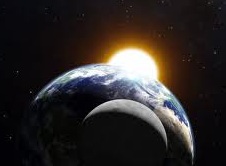
Luni-solar calendars use the sun for measuring the length of the year, and the cycles of the moon for keeping track of months, or lunations.
The modern Gregorian calendar is a solar calendar. This does not mean that one is worshipping the sun. The Biblical calendar is a luni-solar calendar. This does not mean that one is worshipping the moon. It simply means that the moon and sun are both being used for time-keeping. This was the role assigned to them on the fourth day of creation:
(Genesis 1:14-19) (KJV) 14And the CREATOR said, Let there be lights in the firmament of the heaven to divide the day from the night; and let them be for signs, and for seasons, and for days, and years: 15And let them be for lights in the firmament of the heaven to give light upon the earth: and it was so. 16And the CREATOR made two great lights; the greater light to rule the day, and the lesser light to rule the night: he made the stars also. 17And the CREATOR set them in the firmament of the heaven to give light upon the earth, 18And to rule over the day and over the night, and to divide the light from the darkness: and the CREATOR saw that it was good. 19And the evening and the morning were the fourth day.
Using the sun and the moon for measuring time does not make one a worshipper of the moon or the sun. From Adam through Moses no man-made wall calanders were in existance, let alone in use. The Almighty CREATOR designated the functions of His calendar through nature, for the benefit of man, so that it would be easy for man to keep track of time, and keep his appointments with the CREATOR at the appointed times, in their seasons.
Is it any wonder that through mankind's arrogant decision to devise and use a calendar of his own making, that the ETERNAL CREATOR would hide the knowledge of His most important appointment the Seventh-Day Sabbath, so man could no longer trample all over it? To not use the CREATOR's official Scriptural Biblical lunar calander, is yet another example of man thinking he knows more than his CREATOR.
OBJECTION: Roman senator and historian Cornelius Tacitus makes it clear that the Jews kept a Saturday Sabbath. The fact that a pagan associated Sabbath keeping with Saturn proves that the Roman so-called week's day of Saturn, was the same day as the Bible's Sabbath day.
ANSWER: Scripture itself refers to the Israelites worshipping Saturn. Saturn was a planetary 'god'.
Prayer to the planets on their respective days was a part of the worship of the heavenly bodies. (Robert L. Odom, Sunday in Roman Paganism, p. 158.)
Saturday is "Saturn's day" and it is probable that when the Israelites were worshipping this planetary 'god', they were doing it on his day: Saturday. However, such acts of worship were always when Israel was in gross apostasy and rebellion against the ETERNAL. The very first reference to Israelite apostasy over Saturn is found in Exodus 32: the apostasy at Sinai with the golden calf. When the calf was made, they said:
(Exodus 32:1-4) (KJV) 1And when the people saw that Moses delayed to come down out of the mount, the people gathered themselves together unto Aaron, and said unto him, Up, make us 'gods', which shall go before us; for as for this Moses, the man that brought us up out of the land of Egypt, we wot not what is become of him. 2And Aaron said unto them, Break off the golden earrings, which are in the ears of your wives, of your sons, and of your daughters, and bring them unto me. 3And all the people brake off the golden earrings which were in their ears, and brought them unto Aaron. 4And he received them at their hand, and fashioned it with a graving tool, after he had made it a molten calf: and they said, These be thy 'gods', O Israel, which brought thee up out of the land of Egypt.
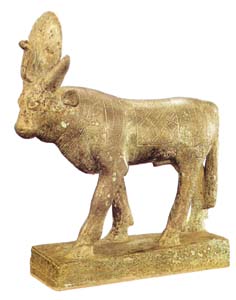
Apis, The Golden Calf.
The ordinary way in which the favourite Egyptian divinity Osiris was mystically represented was under the form of a young bull or calf - the calf Apis - from which the golden calf of the Israelites was borrowed. There was a reason why that calf should not commonly appear in the appropriate symbols of the 'god' he represented, for that calf represented the divinity in the character of Saturn, The HIDDEN one, being only another name for Saturn. (Alexander Hislop, The Two Babylons, p. 45)
Centuries later when the kingdom of Israel was split between the 10 northern tribes and the two southern tribes, the first king of the northern kingdom of Israel, Jeroboam, reinstituted the worship of Saturn.
And Jeroboam said in his heart, Now shall the kingdom return to the house of David: If this people go up to do sacrifice in the house of the ETERNAL at Jerusalem, then shall the heart of this people turn again unto their CREATOR, even unto Rehoboam king of Judah, and they shall kill me, and go again to Rehoboam king of Judah.
Whereupon the king took counsel, and made two calves of gold, and said unto them, It is too much for you to go up to Jerusalem: behold thy 'gods', O Israel, which brought thee up out of the land of Egypt.
(1 Kings 12:26-30) (KJV) 26And Jeroboam said in his heart, Now shall the kingdom return to the house of David: 27If this people go up to do sacrifice in the house of the ETERNAL at Jerusalem, then shall the heart of this people turn again unto their CREATOR, even unto Rehoboam king of Judah, and they shall kill me, and go again to Rehoboam king of Judah. 28Whereupon the king took counsel, and made two calves of gold, and said unto them, It is too much for you to go up to Jerusalem: behold thy 'gods', O Israel, which brought thee up out of the land of Egypt. 29And he set the one in Bethel, and the other put he in Dan. 30And this thing became a sin: for the people went to worship before the one, even unto Dan.
In mercy, the ETERNAL sent the prophet Amos to awaken the Israelites to the danger of this apostasy. The message the ETERNAL sent through Amos asked:
(Amos 5:25-26) (KJV) 25Have ye offered unto me sacrifices and offerings in the wilderness forty years, O house of Israel? 26But ye have borne the tabernacle of your 'Moloch' and 'Chiun' your images, the star of your 'god', which ye made to yourselves.
According to The New Strong's Exhaustive Concordance of the Bible, the word 'Chiun' is: "Another name for the 'god' Saturn". (The New Strong's Exhaustive Concordance of the Bible, p. 194)
The details of Israel's many apostasies, as recorded in Scripture, reveal that the worship of 'Saturn' featured predominantly in their religious rebellions.
The day upon which one worships honors the 'god' of that day. 'Saturn' is the 'god' of 'Saturday' [or "Saturn's" day].
The ETERNAL CREATOR, is to be worshipped on His holy Sabbath day, calculated by His Scripturally Ordained luni-solar calendar. Worship on any other day, calculated by any other calendar, gives honor to a 'god' other than the true ETERNAL CREATOR.
OBJECTION: Various ancient historians, from Cassius Dio, to Frontinus and more, clearly stated that the Jews refused to fight on the 'day of Saturn'. Even the destruction of Jerusalem in AD 70 occurred on 'the day of Saturn'. Clearly, this was the Seventh-Day Sabbath even back then.
ANSWER: This objection is based on the assumption that the so-called 'WEEK' in the time of these Roman historians was identical to the modern so-called 'WEEK'. This is false.
The Julian calendar originally had an eight day so-called 'WEEK'. As Mithraism gained popularity in pagan Rome, the planetary so-called 'WEEK' of seven days also gained popularity.
It seems as if some spiritual genius having control over the pagan world had so ordered things that the heathen planetary so-called 'WEEK' should be introduced just at the right time for ['Mithraism'], the most popular Sun cult of all ages to come along and exalt the day of the Sun as a day above and more sacred than all the rest. Surely this was not accidental. (Robert L. Odom, Sunday in Roman Paganism, p. 157).

Roman stick calendar showing Saturday as the first day, of the pagan planetary week.
Historical records claiming that the Israelites worshipped on the "day of Saturn" do not prove that the modern Saturday is the Sabbath of the Bible. Rather, only one of two facts is thus proven:
- The Israelites were in apostasy, which is why the ETERNAL allowed them to be conquered.
- The cycle of so-called 'WEEKS' between the Israelite calendar and the Roman calendar was different.
Between A.D. 79 to 81, the Emperor Titus constructed public baths at the base of the Esquiline hill in Rome. These baths, known as the Baths of Titus, had many mural designs created by the artist Famullus. On one of the walls in these baths was a stick calendar. It is one of the earliest Roman depictions of the seven-day planetary so-called 'WEEK'.
The significance of this calendar is that it reveals that the pagan planetary so-called 'WEEK' originally began on "Saturn's day". 'Saturday' in the early Julian calendar was not the seventh-day but the first, followed by 'Sunday', then 'Monday' and finally ending on dies Veneris, or the modern 'Friday'.
It was not until the Council of Nicaea in the fourth century AD, that the seven-day planetary so-called 'WEEK' was finally standardized in the Julian calendar to begin on 'Sunday' and end on 'Saturday'.
The light of truth is advancing. Doctrines long buried under the error of assumption and tradition ARE being restored. Will you prize truth enough to obey no matter what the cost? An eternity of happiness awaits all who make the right choice.

Footnotes:
[1] [a]All scriptural links point to the Bible Gateway, A Searchable Online Bible In Over 100 Versions And 50 Languages, located at "BibleGateway.Com", a vast biblical resource containing all the major texts and reference materials useful for in-depth bible studies. Most scriptual quotations are from the (KJV) of the Bible, however versions noted in (parentheses) should also be consulted. [b]All Strong's scriptural references point to the Blue Letter Bible Lexicon, located at "BlueLetterBible.Org", another vast biblical resource which has over 4,000,000 links available, pointing to more than 165,000 pages of concordances, lexicons, dictionaries, commentaries, images, and several Bible versions.